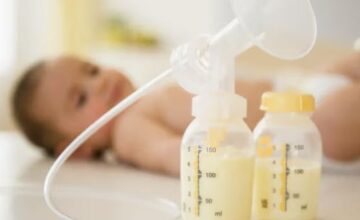
Breastfeeding is a precious bond between mother and baby, providing essential nourishment and fostering a strong connection.
To ensure a comfortable and hygienic breastfeeding journey, it is crucial to prioritize personal hygiene.
In this article, we will explore ways that can enhance your breastfeeding experience while promoting effectiveness, comfort, and practicality.
1. Change nursing clothes daily
Breast milk can leak and spill on your nursing clothes during feeding sessions. Frequent changes help maintain good hygiene and prevent bacteria and odor buildup. This is especially important for avoiding skin irritations or infections on breasts and your baby’s delicate skin.
2. Breast wipes
Always clean breasts before feeding the baby because there may be germs on your skin. Choose a specialized breast wipe free from alcohol, fragrance, parabens, and phenoxyethanol. It should be dermatologically and microbiologically tested, and prebiotic active to preserve good microflora of the breast’s skin.
3. Avoid scented products
During breastfeeding, your baby comes into close contact with your nipples. Scented products, such as perfumes applied to the breast area may contain chemicals or allergens that could cause skin irritation, respiratory issues, or irritate the baby’s sensitive mouth and discourage proper latching, leading to breastfeeding difficulties.
4. Clean your breast pump
According to Chicco Research Centre, Breast milk is a nutrient-rich substance, and any traces of bacteria can multiply rapidly, leading to spoilage. Breast pumps have revolutionized the way mothers feed their babies, offering convenience and flexibility. Both manual and electric breast pumps are valuable tools for expressing milk efficiently and comfortably. To make the process easy, it is advisable to every mother to clean breast pumps daily so that they can prevent bacterial contamination. Regularly cleaning breast pumps helps prevent bacterial contamination and ensures that the expressed breast milk remains safe for the baby to consume.
5. Use nursing bras regularly
Nursing bras are designed with convenience in mind. They can be easily unclasped or opened for breastfeeding, which means they are easier to access that allows hygienic breastfeeding sessions. There is less need for touching or adjusting the bra during feeding, reducing the risk of transferring germs from hands to the breast or baby’s mouth. Look for breathable fabrics, adjustable straps, and a supportive design to accommodate your needs.
6. Wash hands before breastfeeding
As per Chicco Research Centre, Always wash your hands with soap and water before breastfeeding your baby. This simple step helps to prevent the transmission of germs and reduces the risk of infections.Keep an eye on your breasts for any signs of infection, such as redness, tenderness, or discharge. If you notice any abnormalities, consult a healthcare professional promptly.




